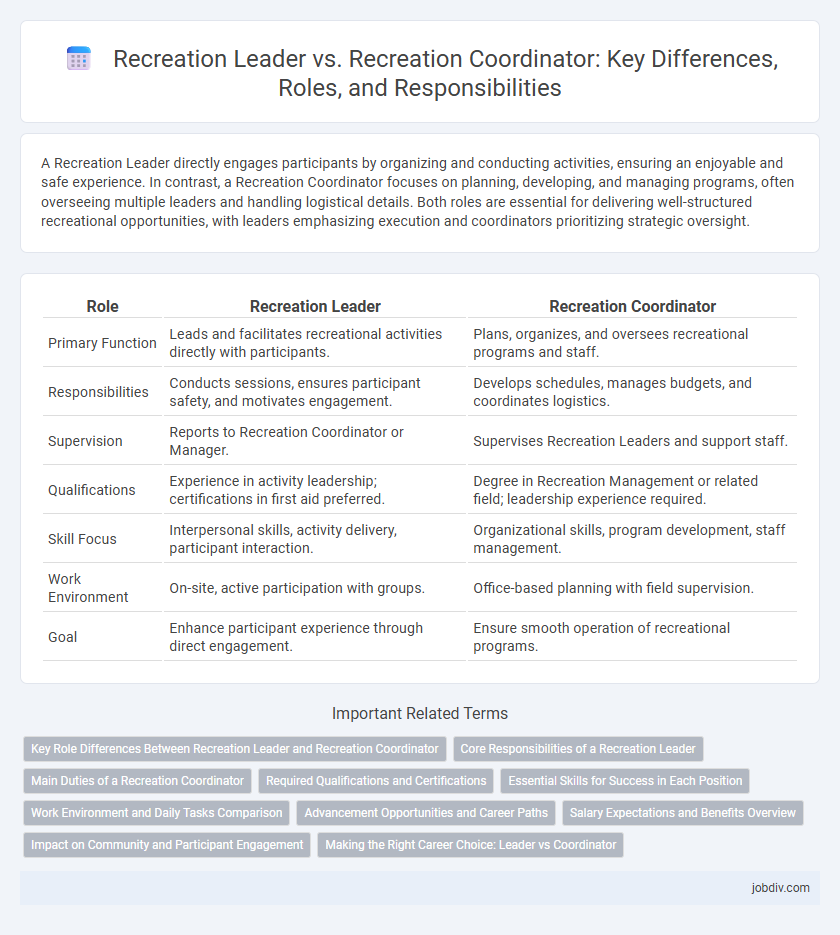A Recreation Leader directly engages participants by organizing and conducting activities, ensuring an enjoyable and safe experience. In contrast, a Recreation Coordinator focuses on planning, developing, and managing programs, often overseeing multiple leaders and handling logistical details. Both roles are essential for delivering well-structured recreational opportunities, with leaders emphasizing execution and coordinators prioritizing strategic oversight.
Table of Comparison
| Role | Recreation Leader | Recreation Coordinator |
|---|---|---|
| Primary Function | Leads and facilitates recreational activities directly with participants. | Plans, organizes, and oversees recreational programs and staff. |
| Responsibilities | Conducts sessions, ensures participant safety, and motivates engagement. | Develops schedules, manages budgets, and coordinates logistics. |
| Supervision | Reports to Recreation Coordinator or Manager. | Supervises Recreation Leaders and support staff. |
| Qualifications | Experience in activity leadership; certifications in first aid preferred. | Degree in Recreation Management or related field; leadership experience required. |
| Skill Focus | Interpersonal skills, activity delivery, participant interaction. | Organizational skills, program development, staff management. |
| Work Environment | On-site, active participation with groups. | Office-based planning with field supervision. |
| Goal | Enhance participant experience through direct engagement. | Ensure smooth operation of recreational programs. |
Key Role Differences Between Recreation Leader and Recreation Coordinator
Recreation Leaders primarily facilitate group activities and directly engage participants to ensure a safe and enjoyable experience, focusing on hands-on program delivery. Recreation Coordinators manage the planning, organizing, and evaluation of recreational programs, often overseeing multiple leaders and handling administrative responsibilities. The key distinction lies in Recreation Leaders executing activities on the ground, while Recreation Coordinators focus on program development, staff supervision, and resource management.
Core Responsibilities of a Recreation Leader
Recreation Leaders primarily focus on direct engagement with participants, organizing and leading activities that promote physical, social, and emotional well-being. They design and implement programs tailored to diverse age groups, ensuring safety and inclusivity throughout events. Their core responsibilities include instructing activities, managing group dynamics, and providing immediate support to enhance participant experience.
Main Duties of a Recreation Coordinator
A Recreation Coordinator primarily oversees program development, planning, and implementation, ensuring activities meet community needs and safety standards. They manage budgets, coordinate with staff and volunteers, and evaluate program effectiveness to foster community engagement. Their role emphasizes strategic planning and administrative responsibilities compared to the more direct activity facilitation by a Recreation Leader.
Required Qualifications and Certifications
Recreation Leaders typically require a high school diploma or equivalent, with additional certifications such as CPR and First Aid, while Recreation Coordinators often need a bachelor's degree in recreation management, kinesiology, or a related field. Certification from the National Recreation and Park Association (NRPA) or similar bodies enhances credentials for both roles, but coordinators may also need project management skills and experience in budgeting. Both positions benefit from strong interpersonal abilities, yet coordinators often demand more leadership training and advanced certifications to oversee programs effectively.
Essential Skills for Success in Each Position
Recreation Leaders excel in interpersonal communication, group facilitation, and creative activity planning, ensuring participant engagement and safety during recreational programs. Recreation Coordinators require strong organizational skills, budget management expertise, and strategic planning abilities to efficiently oversee multiple programs and staff. Both roles demand leadership, adaptability, and a comprehensive understanding of recreational therapy principles to successfully enhance community well-being.
Work Environment and Daily Tasks Comparison
Recreation Leaders typically work directly with participants in community centers, parks, or recreational facilities, organizing and leading activities such as sports, arts, and group events. Recreation Coordinators often hold administrative roles in office settings, managing program schedules, budgeting, and staff supervision to ensure smooth operation of recreation services. While Leaders engage more in hands-on interaction and activity facilitation, Coordinators focus on planning, coordination, and program development.
Advancement Opportunities and Career Paths
Recreation Leaders typically begin their careers managing daily activities and facilitating programs, with advancement opportunities often leading to specialized roles such as Recreation Coordinators. Recreation Coordinators oversee program development, staff supervision, and budget management, positioning them for leadership roles like Recreation Managers or Directors. Career progression in recreation emphasizes gaining certifications, expanding management experience, and demonstrating community impact.
Salary Expectations and Benefits Overview
Recreation Leaders typically earn between $30,000 and $45,000 annually, focusing on direct community engagement and activity facilitation, while Recreation Coordinators command higher salaries, ranging from $45,000 to $65,000, due to their responsibilities in program planning and team management. Benefits for both roles often include health insurance, retirement plans, and paid time off, but Recreation Coordinators may receive additional perks like professional development opportunities and performance bonuses. Salary expectations vary by location, experience, and the size of the organization, with coordinators generally enjoying more comprehensive compensation packages.
Impact on Community and Participant Engagement
A Recreation Leader directly facilitates activities and fosters real-time interaction, significantly boosting participant engagement and creating immediate positive impacts on community well-being. In contrast, a Recreation Coordinator focuses on strategic planning and resource management, shaping long-term community development by organizing programs that meet diverse recreational needs. Both roles synergize to enhance overall community health, social inclusion, and sustained participant involvement.
Making the Right Career Choice: Leader vs Coordinator
Choosing between a Recreation Leader and a Recreation Coordinator depends on career goals and preferred responsibilities. Recreation Leaders focus on direct participant engagement, leading activities, and ensuring safety, while Recreation Coordinators manage program planning, scheduling, and staff supervision. Understanding the differences in hands-on involvement versus organizational duties is crucial for making the right career choice in recreation fields.
Recreation Leader vs Recreation Coordinator Infographic

 jobdiv.com
jobdiv.com